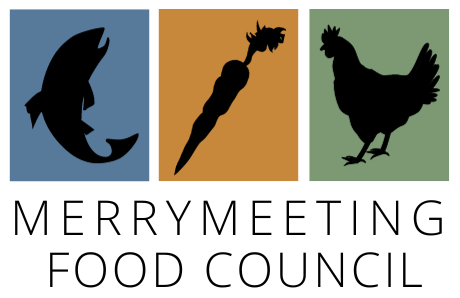Around Maine and nationally, the connections between food and healthcare are growing, from efforts to increase local sourcing of food served which supports local farms to food prescription programs which support access to fresh produce for individuals experiencing food insecurity.
In an effort to help patients and doctors open the conversation about food insecurity and health, as well as to build awareness about the food support network in our region through multiple avenues, MFC worked with Mid Coast Hospital to implement food security screening at their Brunswick walk-in clinic. All patients will be screened with a simple two question survey which can be completed by checking an answer or completed orally. Patients screening positive for food insecurity within the past 12 months will be offered an emergency food supply that is adequate for 2-3 days. This is intended to be enough time for individuals to connect with the food access support network in their community. Patients choose whether to accept this food supply and also will be offered the community nutrition resource guides created by MFC. Funding for the first six months of the emergency food kits, and training for the hospital staff was provided by Good Shepherd Food Bank (GSFB). Emergency food kits are distributed by Mid Coast Hunger Prevention Program (MCHPP). Next steps for MFC include reaching out to additional healthcare facilities in our region to help them build connections with partners like GSFB and MCHPP. Read more here about this type of program and Good Shepherd’s work around the state. Potential future steps for these healthcare partners could be replication of food prescription programs that have been started around the country and just recently in Maine. Learn more about Health Rx programs from the recent Central Maine and Bangor Daily News articles.
***To learn more and share ideas about food access barriers, community health, and community building, join MFC and partners for a community conversation on June 20th!***
In related news:
*Age Friendly Communities of the Lower Kennebec, presented survey results from their work in Arrowsic, Bath, Georgetown, Phippsburg, West Bath and Woolwich. The results were very interesting and we heard several parallels to what was shared with us by residents and organizations during our community assessment work focused on food access. To watch their 5/23/19 presentation, click here. (MFC has not been involved in this work.)
*We found lots to think about in this recent review of WELL: What We Need To Talk About When We Talk About Health by Sandro Galea…
"We can choose the food we eat, but our options are limited by what we can afford and by what kinds of food are available for purchase near our home," he writes. "These factors, in turn, depend on the quality of our neighborhood and the size of our income, which depends on larger social economic forces over which we have little control."
